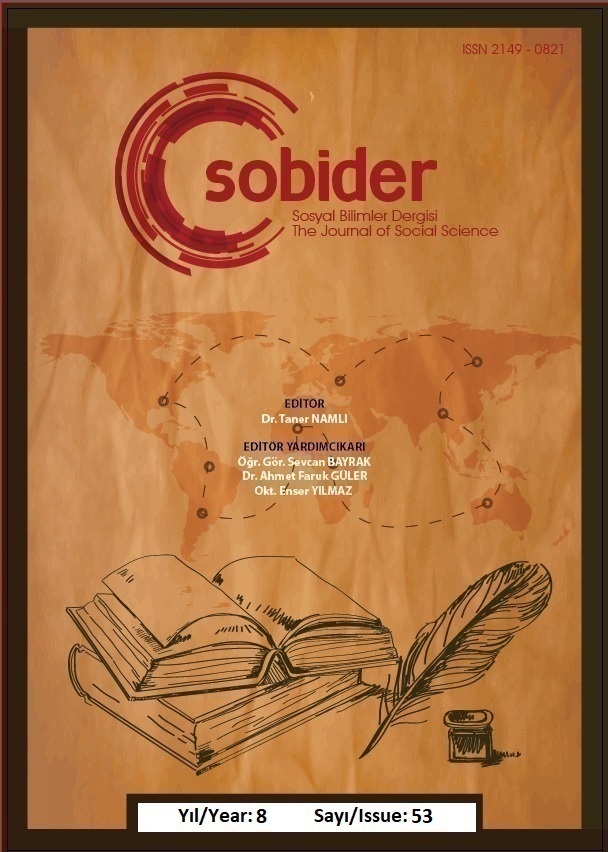Author :
Abstract
İtalya, 21. yüzyılda politik istikrarsızlık ile karşı karşıyadır. Bir yandan hükümet krizleri diğer yandan iktidarda yer alan hükümetlerin görev sürelerinin kısa vadeli olması bu istikrarsızlığı ortaya çıkaran faktörlerdir. Uzun bir geçmişe dayanan Kuzey-Güney ayrımı, bu ayrımı belirgin hale getiren sosyo-ekonomik farklılıklar, coğrafya ekseninde ilgili gelişmelere zemin oluşturmaktadır. Ayrıca yıllar boyunca birbirinden bağımsız devletlerin varlığı ve siyasi birliğin geç sağlanması eklenmelidir. İtalya siyasi birliğinin sağlanması sürecinde ise “ulus”un tam manasıyla inşa edilememiş olması bir diğer handikabı temsil etmektedir. Zira “aidiyet” ve “kimlik” gibi kavramlar belirgin bir taban ve arka plan üzerine oluşturulmamıştır. Bu tespitlerin yanı sıra ülke 1922-1945 yılları arasındaki faşist dönemde kötü bir tecrübeye şahit olmuştur. Dolayısıyla İtalya siyasi birliği sonrası liberal dönemden faşist döneme ideoloji ekseninde yer alan tartışmalar istikrarsızlığa neden olan diğer hususlardır. Son olarak, ekonomik alanda yaşanan krizler ve bu krizlerin yanında yer alan diğer etmenler ön plana çıkmaktadır. Bu çalışma bu genel kapsamı ve ilgili faktörleri göz önünde bulundurarak, İtalya’daki politik istikrarsızlığa neden olan makro ölçekli kavram ve süreçlere odaklanmaktadır.
Keywords
Abstract
Italy faces political instability in the 21st century. Governmental crises, as well as the short tenure of governments in power, are factors creating the instability. The long-standing North-South divide, as well as the socioeconomic differences that make this divide evident, serve as the foundation for relevant developments in terms of the geography. Furthermore, the existence of independent states over the years, as well as the late attainment of political unity, should be added to the equation. Another impediment to the attainment of the Italian unification is the fact that the “nation” could not be established in its entirety. Because concepts like “belonging” and “identity” are not established on a clear foundation and background. In addition to these detections, the country went through a horrible experience during the fascist period between the years of 1922 and 1945. Therefore, the ideological debates arising between the liberal period and the fascist period in terms of Italian unification are another source of instability. Finally, economic crises and the factors that accompanying these crises come into prominence. Taking this broad scope and related factors into account, this study focuses on the macro-scale concepts and processes that creates the political instability in Italy.
Keywords
- AA. (2021). Çok partili koalisyonlar ile yönetilen İtalya bir kez daha hükümet krizi yaşıyor. 18 Mayıs 2021 tarihinde https://www.aa.com.tr/tr/dunya/cok-partili-koalisyonlar-ileyonetilen-italya-bir-kez-daha-hukumet-krizi-yasiyor/2124303 adresinden erişildi.
- Apaydın, F. ve Zenginoğlu, S. (2019). Is economic crisis resolved in Europe?: an evaluation specific to PIIGS countries. 6th International Scientific Research Congress, Ankara: Asos Yayınları, 451-465.
- Armaoğlu, F. (2014). 20. yüzyıl siyasi tarihi. İstanbul: Timaş Yayınları.
- Baş, S. (2019). İtalyan mafyasının doğuşu, yükselişi ve düşüşü. DEÜ Hukuk Fakültesi Dergisi, Prof. Dr. Durmuş TEZCAN’a Armağan, 21(Özel S.), 1949-2001.
- BBC. (2017). İtalya’nın iki bölgesinde özerklik referandumu. 19 Mayıs 2021 tarihinde https://www.bbc.com/turkce/haberler-dunya-41693639 adresinden erişildi.
- Betz, H-G. (2001). Exclusionary populism in Austria, Italy and Switzerland. International Journal, 56(3), 393-420.
- Black, J. (2020). Kısa İtalya tarihi. (Çev. Ekin Duru). İstanbul: Say Yayınları.
- Briganti, F. (2017). Post-brexit politics of the EU: multiple players in multiple cores?. International Issues & Slovak Foreign Policy Affairs, XXVI(3-4), 23-34.
- Briquet, J-L. (2015). Clientelism. (Ed.) Mammone, A. vd. The Routledge Handbook of Contemporary Italy, History, Politics, Society içinde. s. 252-261. New York: Routledge.
- Bull, A. C. (2015). The flactuating fortunes of the Lega Nord. (Ed.) Mammone, A. vd. The Routledge Handbook of Contemporary Italy, History, Politics, Society içinde. s. 204214. New York: Routledge.
- Çelikçi, A. S. ve Kakışım, C. (2013). İtalyan faşizmi ve tarihsel gelişimi. Anemon Muş Alparslan Üniversitesi, Sosyal Bilimler Dergisi, 1(2), 83-99.
- Duggan, C. (2020). İtalya’nın kısa tarihi. (Çev. Tuna Erkmen). İstanbul: Boğaziçi Üniversitesi Yayınevi.
- DW. (2017). Lombardiya ve Veneto’dan daha fazla özerklik talebi. 17 Mayıs 2021 tarihinde https://www.dw.com/tr/lombardiya-ve-venetodan-daha-fazla-%C3%B6zerklik-talebi/a41071136 adresinden erişildi.
- Felice, E. ve Vecchi, G. (2015). Italy’s growth and decline 1861-2011. The Journal of Interdisciplinary History, 45(4), 507-548.
- Grab, A. (2000). From the French revolution to Napoleon. (Ed.) Davis J. A. Italy in the Nineteenth Century (1796-1900) içinde. s. 25-50. New York: Oxford University Press.
- Grew, R. (2000). Culture and society 1796-1896. (Ed.) Davis J. A. Italy in the Nineteenth Century (1796-1900) içinde. s. 206-234. New York: Oxford University Press.
- Hobsbawm, E. (2015). Kısa 20. yüzyıl 1914-1991 aşırılıklar çağı. (Çev. Yavuz Alogan). İstanbul: Everest Yayınları.
- İtalya Cumhuriyeti Anayasası. (1951). (Çev. Akif Erginay). Ankara Üniversitesi Hukuk Fakültesi Dergisi, 8(1-2), 777-805.
- Jansen, C. (2017). Region-province-municipality, spatial planning and spatial Policy in Italy 1860-2016. Historical Social Research, 42(2), 267-294.
- Karaca, M. (2018). İtalyan propagandasında kült lider olgusu: “Il duce” Benito Mussolini. Gümüşhane Üniversitesi İletişim Fakültesi Elektronik Dergisi, 6(2), 1203-1220.
- King, R. (1993). Recent immigration to Italy: character, causes and consequences. GeoJournal, 30(3), 283-292.
- Küçük, H. (2019). Merkez-çevre teorisi ve yerelleşmeye etkisi: İtalya örneği. Journal of Political Administrative and Local Studies, 2(1), 1-26.
- Morgan, P. (2007). The fall of Mussolini, Italy, the Italians and the second world war. New York: Oxford University Press.
- Nelis, J. (2007). Constructing fascist identity: Benito Mussolini and the myth of “romanita”. The Classical World, 100(4), 391-415.
- Parini, E. G. (2015). Mafias, Italy and beyond. (Ed.) Mammone, A. vd. The Routledge Handbook of Contemporary Italy, History, Politics, Society içinde. s. 89-99. New York: Routledge.
- Rızzı, C. U. (2020). Aşırı sağ partilerde lider etkisi Matteo Salvini ve kuzey ligi. (Ed.) Yıldız, U. B. Avrupa’da Yükselen Aşırı Sağ Partiler içinde. s. 183-204. Ankara: Detay Yayıncılık.
- Semino, E. ve Masci, M. (1996). Politics in football: metaphor in discourse of Silvio Berlusconi in Italy. Discourse & Society, 7(2), 243-269.
- Tosun, S. (2018). Bölgeli devlet İspanya, İtalya ve Birleşik Krallık örnekleri. İstanbul: On İki Levha Yayıncılık.
- Wampa, D. (2017). Matteo Salvini’s northern league in 2016 between statis and new ppportunities. Italian Politics, (32), 32-50.
- Yıldız, U. B. ve Çakır, D. Ç. (2020). İtalya’da kuzey ligi’nin ulusal ve yerel politikaları: Matteo Salvini dönemi (2013-). (Ed.) Yıldız, U. B. Avrupa Birliği Ülkelerinde Ayrılıkçı Hareketler içinde. s. 243-262. Ankara: Nobel Bilimsel Eserler.





